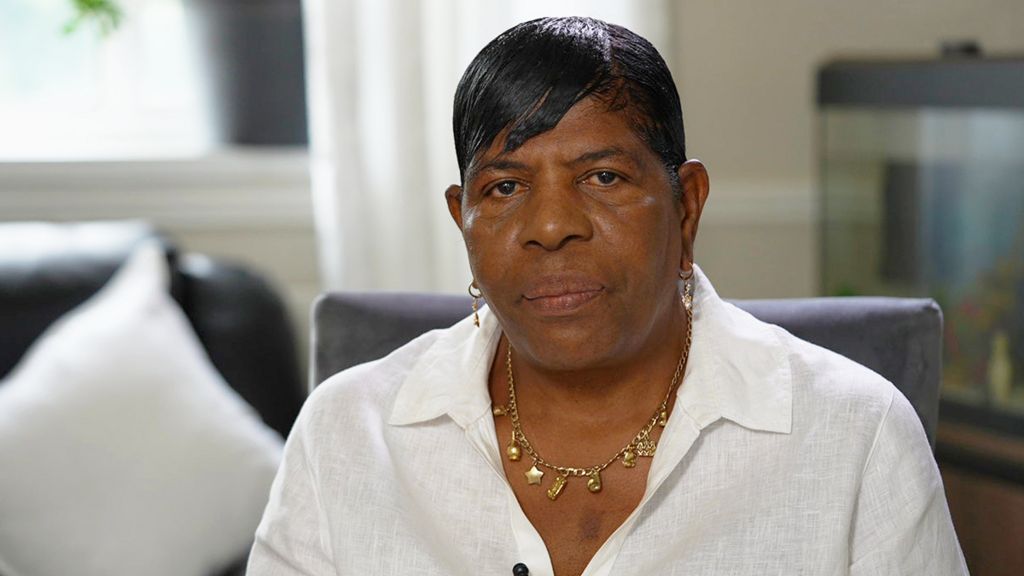ARTICLE AD BOX
By Adina Campbell and Camilla Horrox in Jamaica
Community affairs team

Polly Brown - Eric Hall's mother
The family of a man with schizophrenia is taking legal action against the Home Office for allegedly unlawfully deporting him to Jamaica.
Eric Hall, who arrived in the UK aged 10, has convictions for theft, drugs and possession of an offensive weapon.
The Home Office denies relatives' claims he was sedated before a flight and says the deportation was lawful.
It says the rights of the British public are put before those of dangerous criminals.
Although he was born in Jamaica, the 38-year-old moved to the UK with his family in the early 1990s and was granted indefinite leave to remain.
He was diagnosed with paranoid schizophrenia in his early teens, and his family and legal team say most of his past criminal behaviour - he has 28 convictions for 55 offences - was largely down to his poor mental health. They believe he has only ever been a danger to himself, rather than wider society - and that he continues to be seriously vulnerable.
Critics of the Home Office policy say Eric's deportation, on grounds of his Jamaican citizenship, has echoes of the Windrush scandal. In 2018, many adult children of post-war Caribbean migrants, despite having lived and worked in the UK for decades, were told they no longer had the right to stay. The scandal led to the government apologising for Home Office immigration mistakes against Caribbean migrants and their subsequent mistreatment.
Before he was arrested in early March, Eric had been living in supported housing in east London and was being cared for by a mental health community team. His family says if he was sent a letter by the Home Office about his deportation he would not have understood its significance.
Eric was taken to a detention centre where, his lawyers and family say, his mental state deteriorated considerably. He repeatedly told them he had not been served any deportation papers and did not think he was about to be flown out of the country.
Deportation flights from the UK to Jamaica are among the most controversial carried out by the Home Office. Adina Campbell has been to Jamaica to meet some of the people affected.
Eric's legal team say they were challenging his deportation but were not sent key paperwork from the Home Office which must be served legally within three days of someone's departure.
Immigration lawyer, Holly Stow, also says they asked charity Medical Justice to assess Eric - their report concluded that because of his paranoid schizophrenia he should not have been detained and he was not fit to fly.
The Home Office says foreign criminals, and their legal representatives, are served their removal directions in advance of flying.
"All claims raised are fully considered and determined before deportation, including where applicable via the courts."
Eric was put on a plane on 18 May.
"He's a sick boy. I live with him and I know," says Errol Brown
Eric is too unwell to be interviewed - but in a remote farming town in the south-west of Jamaica we meet his elderly stepfather - Errol Brown. He talks to us on a hilly main road, outside a parade of boarded-up shops.
"He's sick. He's a sick boy. I live with him and I know," says Errol, his hands shaking before wiping tears from his eyes.
He is now caring for Eric full-time at his home in St Elizabeth Parish - but says his stepson needs medication and face-to-face mental health support which isn't routinely available in Jamaica.
BBC News has seen medical documents confirming Eric's paranoid schizophrenia - a condition also referenced in Home Office correspondence to him.
Before his removal from the UK, Eric's family say he had been refusing to take any medication, and that on his arrival in Jamaica it appeared as if he had been heavily drugged. They say he didn't recognise his stepfather in Jamaica's capital, Kingston, and had no memory of how he got there.
"Out of the blue we heard Eric was in Kingston," says Errol Brown. "He can't explain to me how he got here. I have asked many times. I know he was out of it. He would have had to have been sedated or knocked out. He didn't know where he was and he didn't have a clue who I was."
The Home Office rejects the claim Eric was drugged. "Passengers are never sedated on removal flights and it's wrong to suggest otherwise," it said in a statement.
Image source, Polly Brown
Image caption,"When I used to go to school for his reports they always said good things about him," says Eric's mother Polly Brown
Eric's mother Polly Brown, who lives and works in London, decided to take legal action because she says the Home Office was aware of her son's complex, long-term medical history. Given the severity of his mental health condition his family say he is unable to legally represent himself. Mrs Brown is now acting on her son's behalf.
"He only has his stepfather to look after him in a strange country that he left when he was 10 years old," she says.
In her east London flat, surrounded by family photos, her mood momentarily brightens as she shares childhood memories.
"He was very loving. When I used to go to school for his reports they always said good things about him."
She describes how he was passionate about art and once painted a picture of his own face which was displayed in the school reception area. He was also a talented footballer playing for an academy outside of school. "His manager used to call him the gazelle," she says.
But it's not long before those fond memories vanish as her mind is then thrown back to the present.
"We all know that Jamaica now has become very violent. There are guns everywhere and there are killings every day," she says. "It breaks my heart thinking about it - that he's out there and he might get killed."
Deportation flights are used to remove both foreign criminals who have finished UK jail sentences and other foreign nationals who have stayed in the country longer than legally permitted. Between April 2020 and May 2022, the Home Office carried out 130 enforced-return charter flights - at an average cost of £200,000 per trip.
Jamaica represents about 1% of the UK government's overall enforced returns. Between 2019-21, 104 Jamaican nationals were sent back.
Errol Brown fears for Eric's health. Care in Jamaica is free for people on the lowest incomes but public sector facilities are often understaffed, with medical shortages and a lack of funding. Errol can't afford to go private.
"I took him to the doctors after he landed because I was worried about medication, but our doctors out here don't deal with these kinds of things," he says.
In the UK, the family has developed a close relationship with their local MP who is now challenging the government. Janet Daby raised a question in parliament on the day Eric was deported and supports all of the family's claims.
"In his younger days, he'd been groomed… coerced into getting involved in criminal activity. He's severely unwell."
She describes Eric's criminal activity as "low level" and says he has been "demonised and shipped off to another country".
Janet Daby MP says Eric Hall has been "demonised and shipped off to another country"
The Home Office says it helps fund charitable organisations in Jamaica so deportees can "re-integrate back into society" - but Eric's family says he hasn't been offered any ongoing support. On arrival in Jamaica we were only able to locate one such charity. They told us they receive funding from the Home Office but did not want to be interviewed.
Eric Hall's experience in Jamaica isn't an isolated case.
We've spoken to six other men, all with criminal convictions, who were flown from the UK and now live on different parts of the island. All say they've had no ongoing help and have been unable to find secure employment, training and housing.
They say deportees like them are stigmatised and they worry for their safety. Some have had no choice but to live with elderly relatives, while others struggle to survive on the streets of downtown Kingston, where shootings and gang crime are rife.
Jamaica's minister of legal and constitutional affairs, Marlene Malahoo Forte, says she takes "serious issue" with the UK's deportation policy of sending those who have little or no ties to the island and have been "socialised in the British culture".
She says there is "disregard or insufficient regard" for matters of family ties.
"It's almost tantamount to the old method of punishment of transportation."
In a statement, the Home Office said: "We are clear that foreign criminals should be deported from the UK wherever it is legal and practical to do so. Any foreign national convicted of a crime and given a prison sentence is considered for deportation at the earliest opportunity."
Downtown Kingston, Jamaica
But Eric Hall's lawyers say he deserves to continue living in the UK - and they have filed a claim of unlawful detention and deportation against the Home Office.
"Eric's human rights have been breached. It's just wrong and completely unfair," says Holly Stow. "There's a sense of desperation here from the Home Office to get people on a flight who shouldn't be on that flight - and shouldn't be detained in the first place."
The Home Office says it remains committed to "removing foreign nationals with no right to be in the UK" - but Polly Brown hopes and prays her son will return.
Meanwhile Errol Brown in Jamaica says he will continue to care for Eric as best as he can while he is able. But he warns that time is against them.
"There's no future at all here. He can't survive on his own."

 2 years ago
77
2 years ago
77








 English (US) ·
English (US) ·